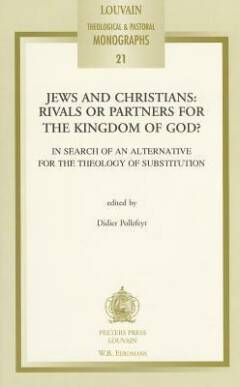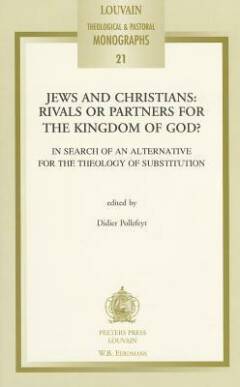
- Retrait gratuit dans votre magasin Club
- 7.000.000 titres dans notre catalogue
- Payer en toute sécurité
- Toujours un magasin près de chez vous
- Retrait gratuit dans votre magasin Club
- 7.000.0000 titres dans notre catalogue
- Payer en toute sécurité
- Toujours un magasin près de chez vous
Jews and Christians: Rivals or Partners for the Kingdom of God?
In Search of an Alternative for the Theology of Substitution
Pollefeyt D.
13,63 €
+ 27 points
Description
For centuries, the Christian churches and Christian theology have sought to forge their own identity by challenging the identity of Judaism. Christians often inquired whether Israel was still the people of God, whether the church had replaced Israel. An affirmative answer to the latter inquiry is often described as the "theology of substitution" the church has taken Israel's place. The implication is that there is no longer any place for Israel in God's plan of salvation. The history of Christian anti-Judaism is dramatic proof of the violent potential that is implicit in this Christian theology of substitution. After Auschwitz, the search for an alternative to this theology, a search which touches the heart of Christianity, has become a necessity. The central question of this book is whether - and how - Christianity can maintain its identity if it no longer understands itself as a substitute for Judaism. How can one combine witness to one's own faith with respect for the convictions of the other ? If Jews regard themselves as a chosen people - as the Bible explicitely affirms - and Christians regard Jesus as the unique savior of humanity, how are Jews and Christians to approach one another ? Is there a basis, within Christianity and Judaism, to accord salvific value to another religion ? In a pluralistic world, can Christians and Jews form a coalition to cooperate in realizing God's Kingdom on earth ?
Spécifications
Parties prenantes
- Auteur(s) :
- Editeur:
Contenu
- Nombre de pages :
- 144
- Langue:
- Anglais
- Collection :
Caractéristiques
- EAN:
- 9789068319477
- Date de parution :
- 01-01-97
- Format:
- Livre broché
- Format numérique:
- Trade paperback (VS)
- Dimensions :
- 140 mm x 218 mm
- Poids :
- 204 g

Les avis
Nous publions uniquement les avis qui respectent les conditions requises. Consultez nos conditions pour les avis.






